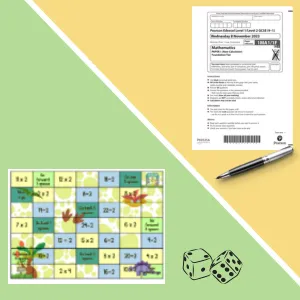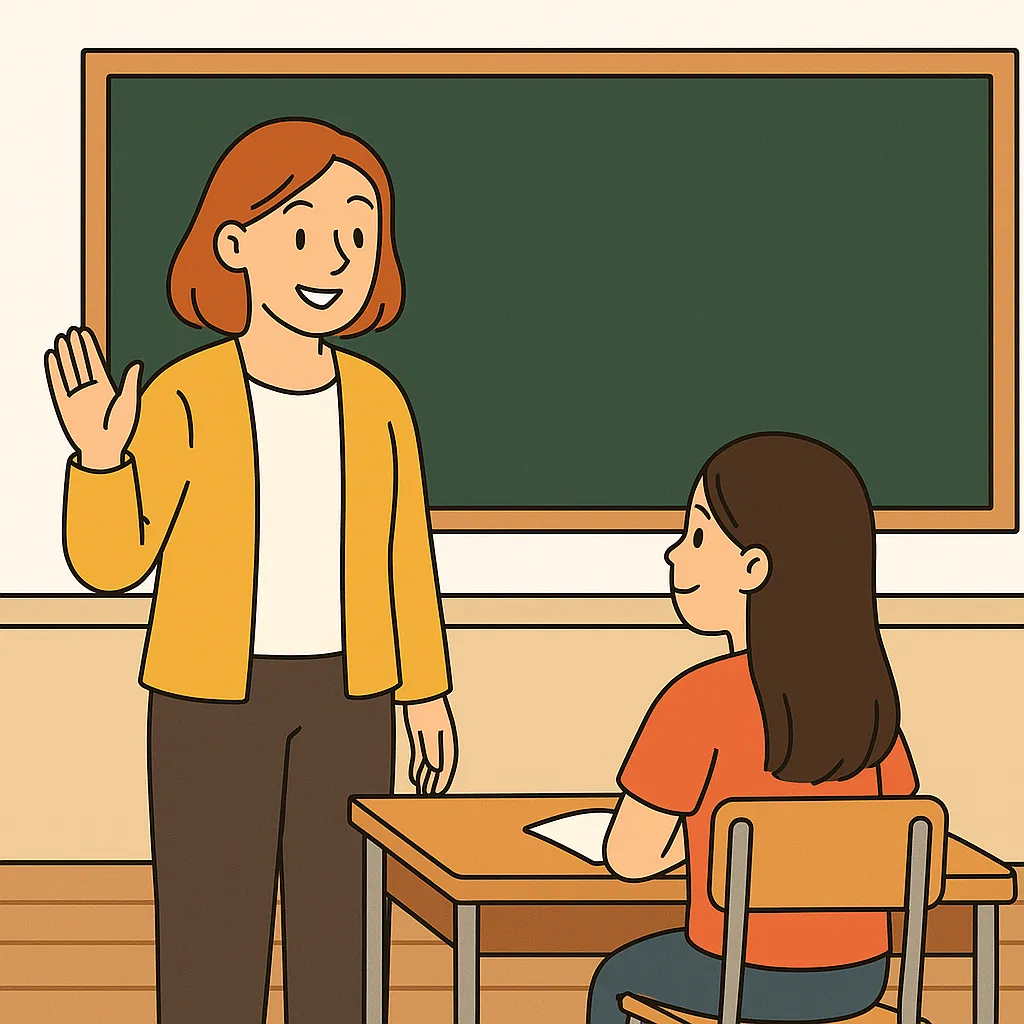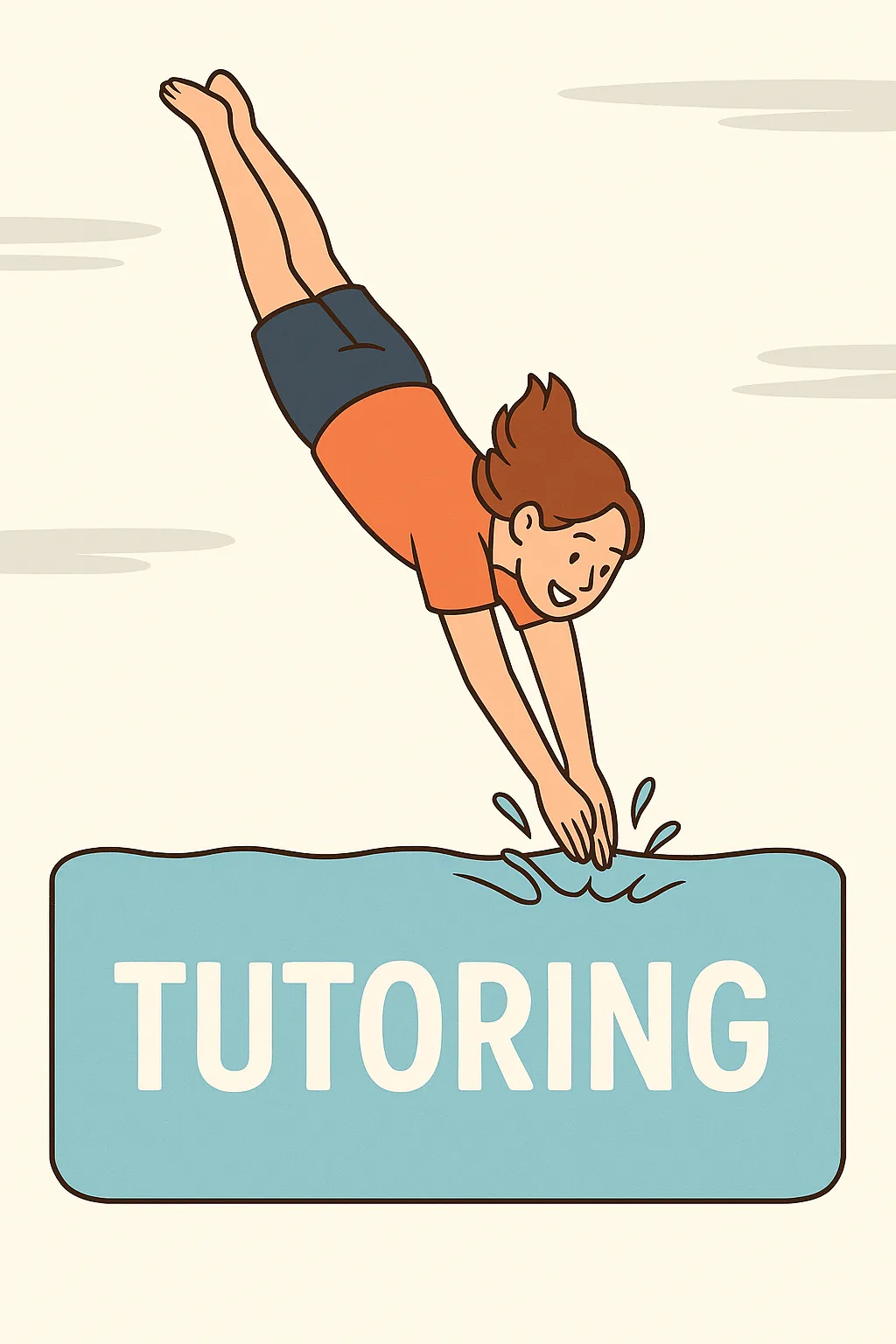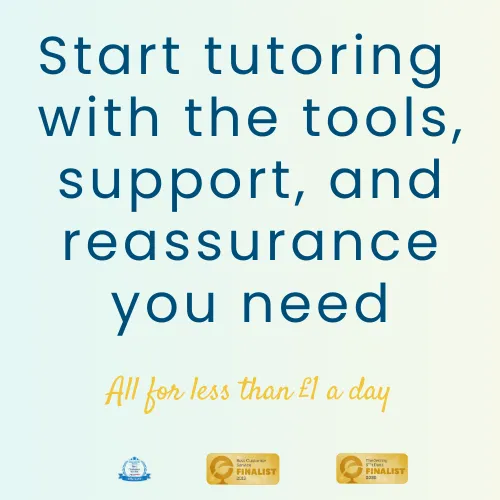
How do I figure out what age group or subject I should specialise in so I can attract the right students?
Before we begin, please can I suggest that your thoughts and opinions will inevitably change over time. When I started tutoring my goal was to work with primary school aged children, particularly those regarded as SEND, as that was my comfort zone and where my experience lies. I had theoretical knowledge about working with secondary school children, but not practical hands-on knowledge or confidence.
If you'd rather watch a video version of the article click here
Your thoughts and opinions will inevitably change over time.
However, a couple of years into tutoring, a friend of my ex-husband got in touch. She had heard through the village grapevine that I was now tutoring and asked if I could help her daughter with her GCSE maths.
I am very much a people pleaser. My brain screams inside my head to say no, however the mouth refuses to co-operate and I said yes. I stated that it had been a long time since I had done my GCSEs, and my knowledge was probably a bit sketchy. But we could give it a go and if at any stage they weren’t happy we could stop, no offence would be taken.
Every week I would spend hours relearning the content and creating “how to solve…” sheets to take with me (for my benefit as much as hers). When it came to the exam, she passed.
Her mum was close friends with the local lollypop lady, and I soon ended up supporting her daughter with her GCSE maths as well. From there it snowballed. The lollypop lady told everyone how her daughter’s confidence had improved and how their friend’s daughter had passed with my help, and the number of GCSE students I supported skyrocketed.
These days I work with very few primary school children; it is with the GCSE students that my heart lies, but if you had suggested that when I first started out, I probably would have broken down in hysterics.
Why Specialising Matters More Than You Think
When we first walk into the world of tutoring it is very easy to think we can support any body studying a specific subject. In fact, I remember a friend saying to me once, that really knowing the subject content was irrelevant, you could actually support anyone with any subject.
I think I would have to dispute this. In part because of the amount of work you would create for yourself. The resources you would need to support a reception child with a subject would be vastly different to that of an A’ level student.
Then we might also consider that there are numerous different learning styles that we need to take into consideration. A girl I was working with recently suggested that more children would perform better if school classes were split according to learning style rather than perceived academic abilities. She felt that there would be more high achieving children if classes were split this way. I feel she probably had a point.
Being known as “the go-to person” for a certain type of learner or subject can mean higher rates and easier word-of-mouth recommendations. A scenario that is commonly used to demonstrate the power of specialising is if you are looking for brain surgeon you would no doubt go to a specialist rather than a GP. It’s an extreme example, but it highlights a point.

Think carefully about the resources you will use as a tutor
Understanding Your Strengths and Passions
What lights you up? Is it explaining tricky maths in a fun way, helping reluctant readers find their confidence, or supporting teens with exam technique? One of the first girls I ever went to was struggling to keep up in class. She had ADHD and found it hard to concentrate, as a result she was falling further and further behind her peers. When I started working with her, we would play a lot of games. Some would be board games, others would involve spreading the answers to some specific questions around the kitchen floor where we were working. I would ask her a question, then she would need to go and find the correct answer. Fairly rapidly her knowledge and her confidence started to soar, and she started to hold her own in class again. At this point, her mum asked if we could “do some proper maths now”.
Your style may not suit everyone. I stopped working with that young girl and they signed up to work with a large franchise where the learning is done by rote. I’m not sure how she got on. But as one door closes another, as corny as it sounds, another one genuinely does open.
Again, back in the early days, one of the lads I went to was just meant to be for the summer holidays. They lived a good 45 minutes away from where we were living and I was only charging £10/hour at the time. (this is going back many years!)
The first week I turned up, the mum invited me in, and the lad, about 5 years old, sat at the table head down looking like he wanted to cry. I introduced myself and showed him the games I had with me. The mum had mentioned that he liked cars and maps, so I had created a game where you moved around the street/board and answered the questions as you went.
By the end of the first lesson, he looked quite proud of the stickers he had earned.
When I arrived the following week he came to the door with his mum, though he sheepishly stood behind her.
By week 3, he was sitting on the doorstep waiting for me.
This creative learning is what inspires me, I enjoy thinking about what we can do to make it more enjoyable.
I have another tutor who works with me. When I first meet him, he seemed fantastic, then after I offered him the job he said: I have a way of tutoring, and I don’t intend to change it. In my mind I was thinking ok, we’ll see how this turns out. But, he is incredible! He is a retired British Airways engineer, and he has the ability to make anything relatable. He breaks the most complex of ideas into small relatable chunks, then once you have grasped that he builds you up and then points out how easily you did it leaving you in awe of what you are capable of. That’s what lights him up.
Anther tutor has the patience of a saint and will walk you through the question at your pace looking at what the questions wants you to do and how to go about answering it.
There is someone looking for your style whatever it is, and the clearer you can be about how you enjoy working, the easier you will find it to explain to parents and find the students to support.
Be yourself and you will find it far easier to follow through.
Working with Younger vs. Older Students – What’s the Difference?
You would probably think it is the content and the presentation that makes the biggest difference between how you support a child of different ages. To a degree, you would be right. However, it goes deeper than that.
There are differences in energy, attention span, and lesson planning needs. Many younger children will struggle to focus for more than a few minutes on a task so what you present will need to move at a much more rapid pace.
You will also need to put in a lot more energy and excitement. A young lad I used to go to (I used to love working with him) would expect you to stand and clap and whoop and cheer him whenever he won a game. I feel that if I was to behave like that with some of the older kids I work with, they would think I had completely lost the plot. The enthusiasm might still be there, but it is presented very differently. Working with older children is, more like working with an adult. But we also need to remember that we are all completely unique and a child and how we work with them will be determined by their personality not their age.
Matching Your Style to Different Learning Needs
As inferred in the previous paragraph you need to be able to adapt your teaching style to the learning needs of the individual you are working with. You almost need to present like a chameleon constantly adapting to the environment in which you find yourself.
A few years back a lady got in touch to work with me. Her CV was phenomenal. She had travelled the world teaching English as a second language and for a period had been employed as a headteacher. She was lovely, a down-to-earth genuine person.
Whenever a tutor goes to a family for the first time I follow up with them to make sure everything has gone and to give the tutor the positive feedback, as I am sure it is something that motivates us all.
I contacted the first family. Their response: she is a lovely person, but I don’t think we will be continuing. Thank you.
The second family gave me exactly the same response.
That I hadn’t expected…
The third family were on the phone before I had the chance to call them. They had expected one to one tailored support, they had not expected someone to just come in and start teaching without knowing anything about their child. This was not what they were looking for and her annoyance continued.
I apologised profusely and took over. But it was apparent that this lady had spent so long teaching in a classroom situation that she had lost the ability to adapt to one-to-one support.
Another conversation I had with someone that concerned me was when he acknowledged that surely the teacher was doing a great job if 97% of her class got “it”. On some levels I agree, however our goal as tutors is to adapt and support the 3% who are left floundering and who don’t get “it”.
If you always remember that as a tutor you are privileged to work in small groups or 1:1, We have the ability to take our time and focus on every child and their learning style and ensure we are making sense in our explanations. If we aren’t, we have to acknowledge that and we need to try again, find another way and not expect the child to adapt to us.

Who do you want to work with? Will you work one to one, or in a group setting? Each option has hugely different teaching styles
Balancing Enjoyment with Market Demand
So far, I have pretty much implied that you get to choose the subject and who you tutor. and there will be someone out there who is looking for it. However, to get started life will be easier if you can find people to vouch for you to hold their hands up and say “yes, I recommend this person”. However, if your goal is to support Ancient Greek to pre-school children in your home in the middle of the North Yorkshire Moors, your potential market will be quite restricted. Ok, I have exaggerated this point to bring it home, but you will hopefully see my point. Some subjects: maths, English, science are popular through most age groups, others will be more niche, and you might have to be more adaptable to the age group and or your method of presenting the lesson.
It might take time to find the sweet spot between what you love teaching and what parents are actively searching for. Sometimes you’ll be asked to teach outside your comfort zone —There are times when you will want to stick by your love and reject the opportunity to support a different subject; I have always said no to supporting science because I don’t know enough about it. In recent years I have had University medical students work with me and I have now started passing the work on to them, but for me, I’m not interested I know there is more than enough work within my comfort zone to provide me with the income I need from tutoring and to grow the business.
How to Test the Waters Before You Commit
If you’re not sure who/what to start with can I suggest you carry out a couple of trial sessions with different ages or topics before branding yourself.
You will find that some ages, some subjects will fit more comfortably with you than others.
I still try to avoid working with the higher-level GCSE maths students if I can, I don’t feel as if I have enough to offer, that their knowledge is quite possibly better than mine. I can work it out with you, but I may not be able to explain it to you straight away.
I’ve only learned what my comfort zone is through experience; it is working with those GCSE students for whom getting a pass will change their lives for ever.

Test the waters before you dive in
Specialising Without Closing Doors Too Soon
It is fine to start with, for example, supporting secondary school maths and slowly refine it over time to GCSE maths, a specific syllabus, a specific learning style, etc. And like I mentioned initially, you may start off down one path, but experience takes you towards another one.
I think many of us get into tutoring because we believe we can be creative with how we can present our lessons but after a year or two we find ourselves once again just going through the motions. This might be the time that you realise that you wanted to broaden what you offer or deviate slightly so that you are walking through new territory and once again push yourself to do things differently.
Building a Reputation Around Your Niche
Consistent results, parent feedback, and word-of-mouth can often cement your niche. One of the most powerful pieces of feedback I ever received was from the mum of a lad who is ASD. (I’ve removed his name, but the rest of the email remains the same):
Hi Dawn
I wanted to say a huge ginormous thank you to you for everything you've done for F. You have helped him so much in his maths and English. But for him it's more than that. Before starting with you he was in a really bad place. He felt education wasn't for him and had no hope of passing anything or achieving anything. But by teaching him maths in a way he understood he started to believe that he wasn't totally stupid and maybe he could pass. And then that spiralled as he got better at maths he starting thinking he could maybe do other things and it's really changed his whole outlook. I never thought i'd be sitting here with him discussing A levels let alone him considering going to college after 6th form to studying computing. He is like a different person!
He wanted me to ask you if there was somewhere he could leave a review for you as he wanted to say thank you and tell other people how good you were for him.
So, a huge thank you from all of us and we will let you know how he gets on.
I hope you have a wonderful summer!
(He got a level 8 in maths).
That’s why we do what we do as tutors. We are lucky enough to be able to change the lives of hundreds of children and that really is a true privilege.
But messages like this also motivates us to do more. We can see the power in what we do, and it pushes us forward and in doing so it spreads the word about what we do, and it escalates and snowballs and the dream of what we can achieve can become our reality.
Finding your niche is rarely a straight line — it’s a journey of trial, discovery, and a few surprises along the way.
If you’d like to share your thoughts, swap ideas with other tutors, and get support while you figure it out, you might enjoy our Tutor Support Group.
It’s a friendly space where we talk about exactly these kinds of questions, swap real-life stories, and help each other grow as tutors.
Copywrite: Clara James Tutoring 2025

